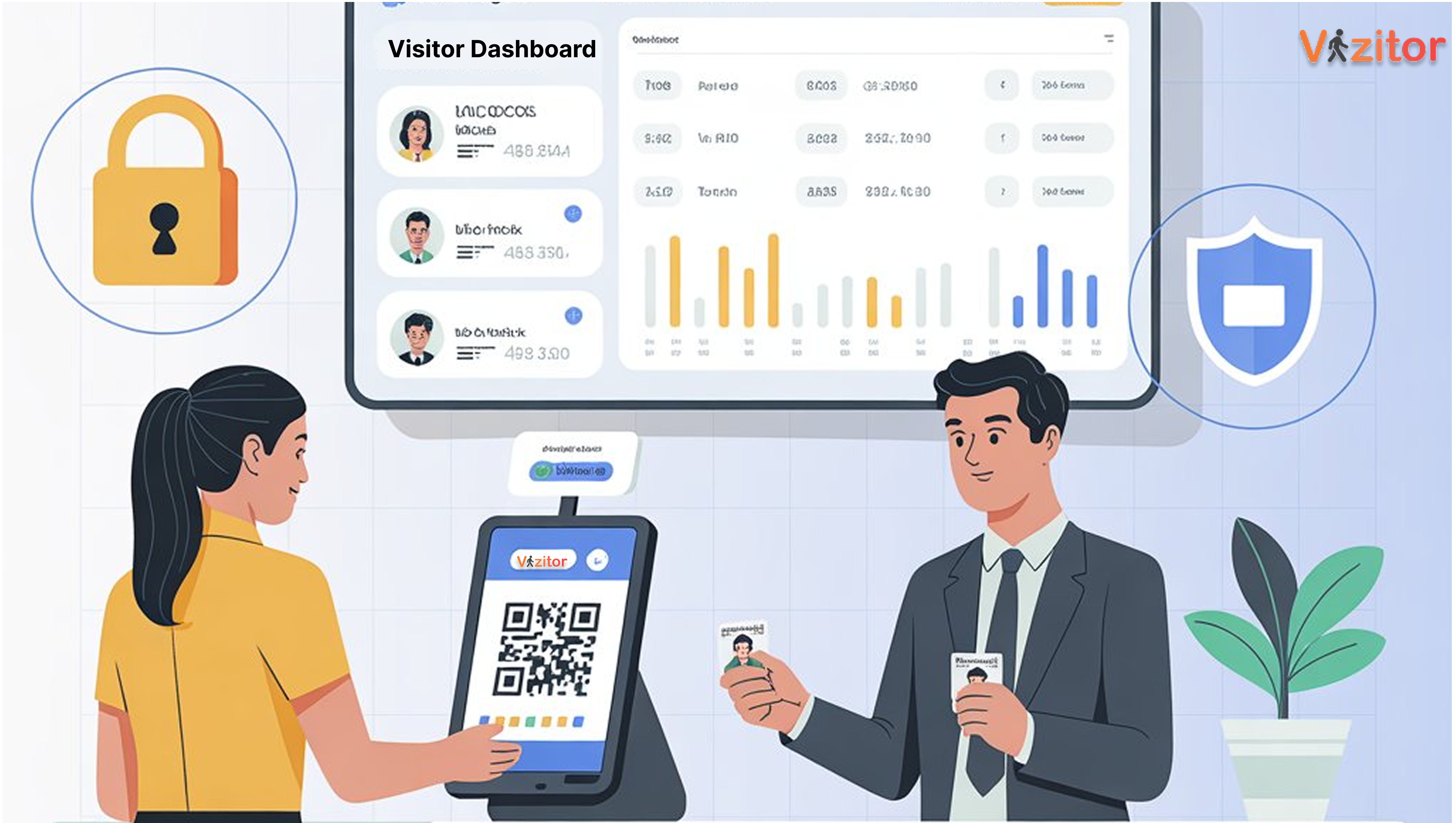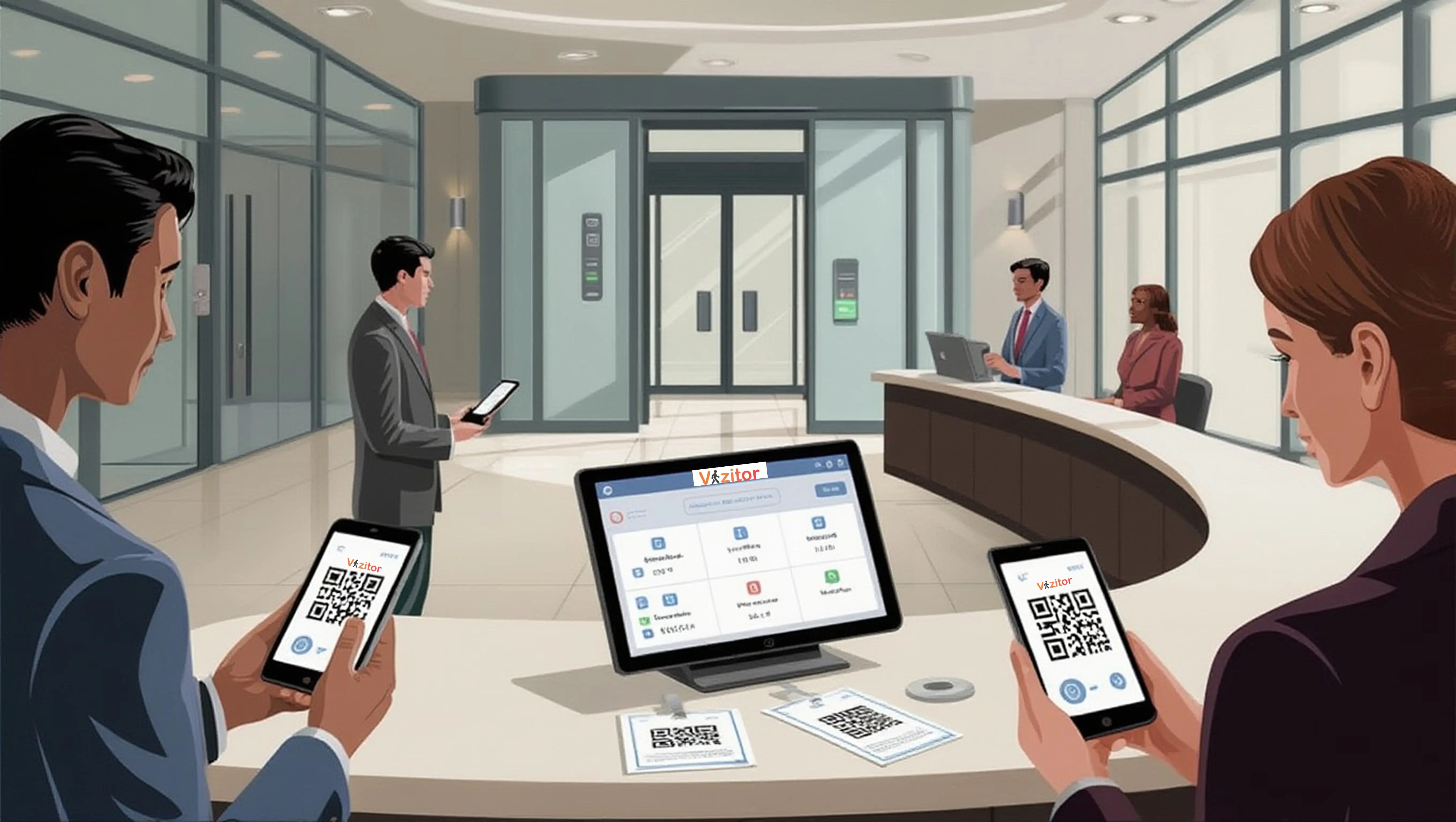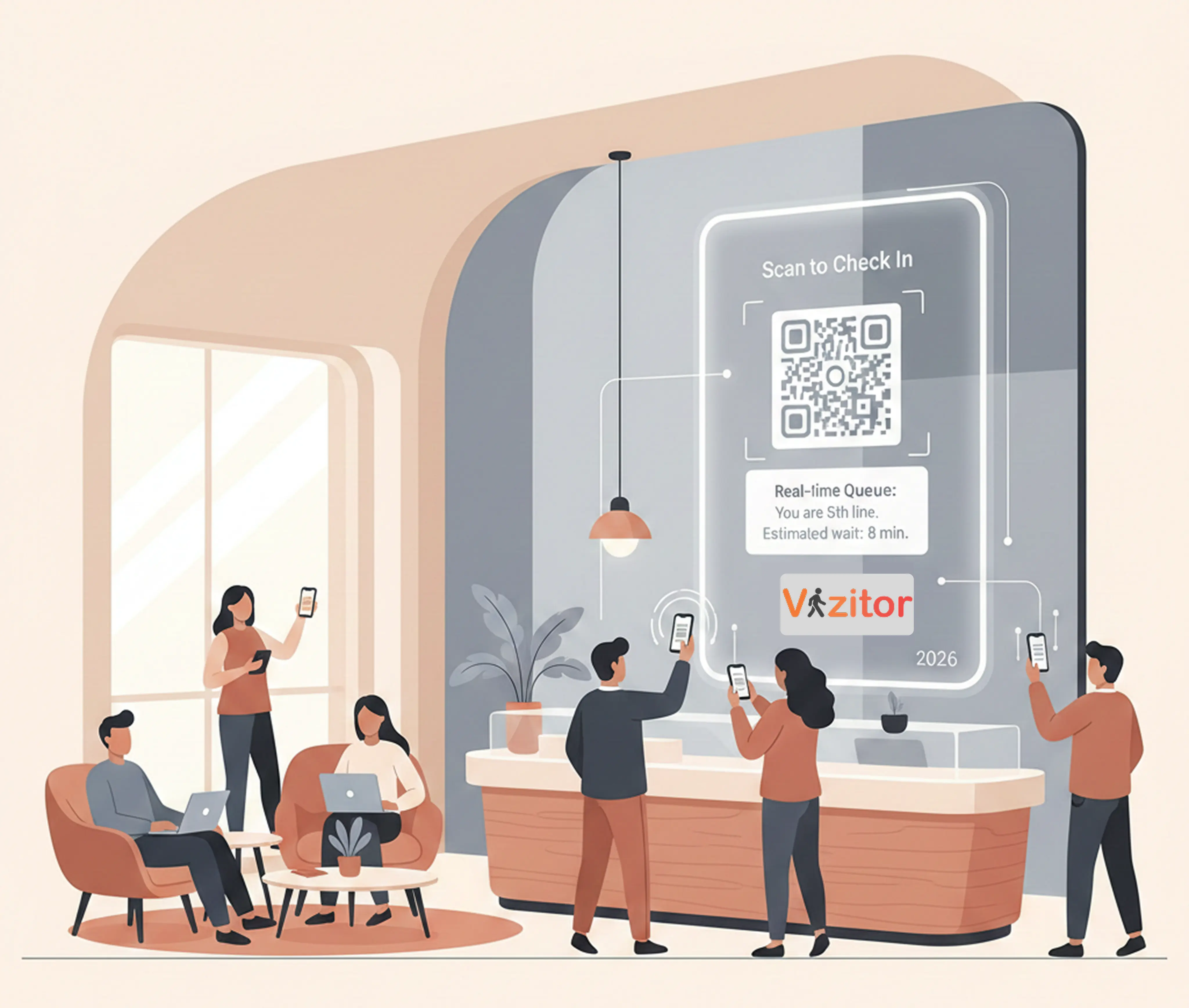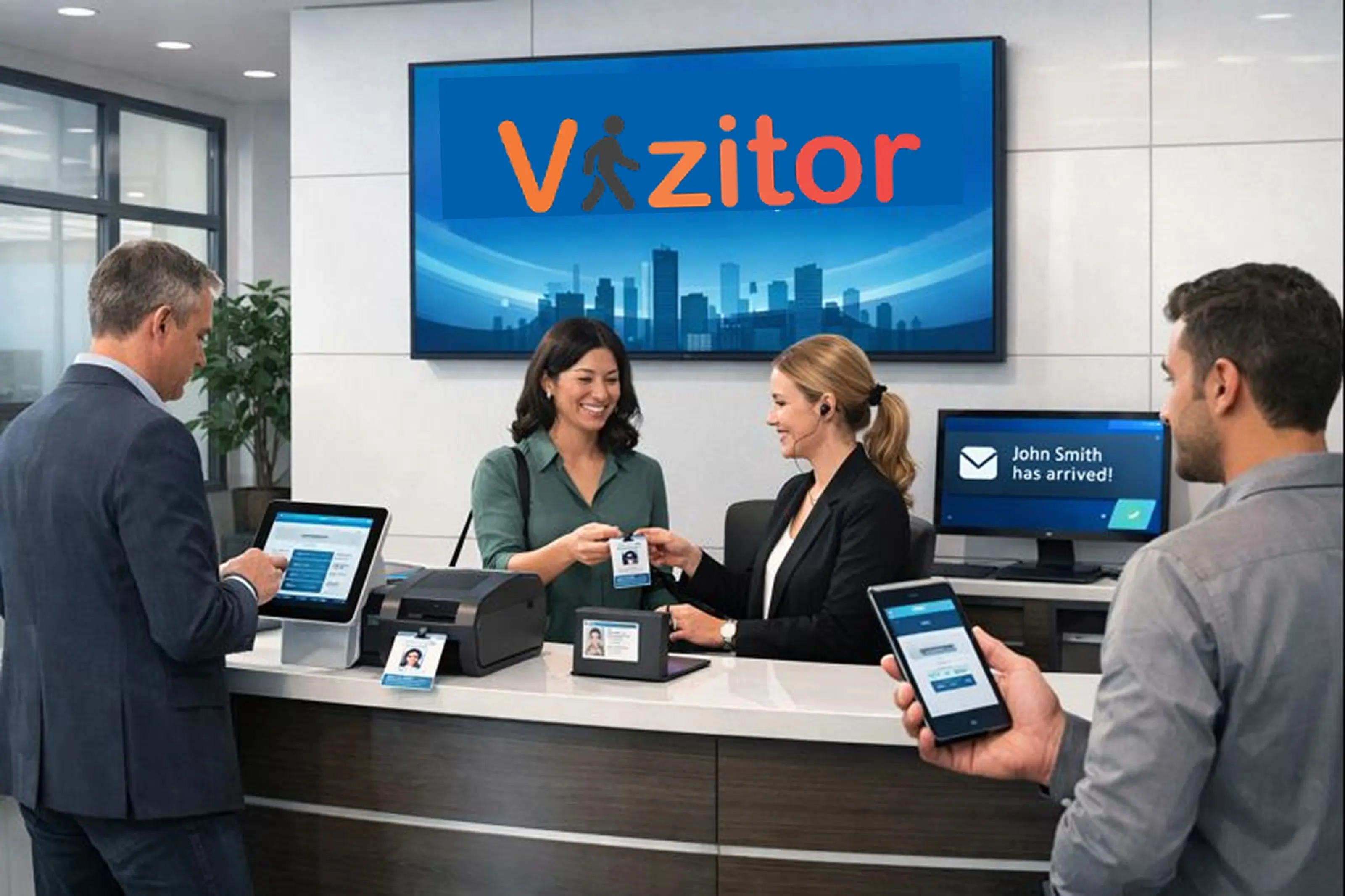Table of Content
Try Vizitor for Free!

Published on: Thu, Aug 28, 2025
Read in 5 minutes
In today’s world, businesses are expected to balance two critical responsibilities: keeping their workplaces secure and safeguarding personal data. With increasing regulatory scrutiny and rising concerns around data privacy, organizations cannot afford to treat visitor management as just a sign-in process.
Modern Visitor Management Systems (VMS) have transformed the way companies welcome guests, contractors, and vendors. Gone are the days of paper logbooks, which were not only inefficient but also a privacy nightmare. Instead, businesses now use digital visitor management systems that streamline check-ins, enhance security, and store visitor data in a secure, compliant manner.
But here’s the challenge: with every visitor interaction, businesses collect sensitive information: names, phone numbers, government IDs, photographs, health details, and more. If this data is mismanaged, organizations risk legal penalties, reputational damage, and erosion of trust.
This is why data privacy in visitor management systems is not optional, it is a business necessity.
In this blog, we’ll explore:
- Why visitor data privacy is critical for businesses in 2025 and beyond
- The role of GDPR, HIPAA, and other compliance frameworks in visitor management
- Best practices to ensure visitor privacy protection
- How cloud-based VMS solutions enhance data security
- Actionable steps for businesses to align their visitor management with global privacy standards
Why Visitor Data Privacy Matters
1. Visitors Trust Your Brand with Their Data
When a guest signs in, they trust your organization with personal information. A simple breach or misuse of data can lead to loss of credibility. In a digital-first world, privacy is directly tied to brand reputation.
2. Non-Compliance Leads to Heavy Fines
Privacy regulations like GDPR in Europe, HIPAA in the US (for healthcare), and India’s Digital Personal Data Protection Act (DPDPA 2023) are strict about data handling. Non-compliance can lead to fines running into millions of dollars.
3. Cybersecurity Threats Are Rising
Paper logbooks used to sit in the open, accessible to anyone. Today, the risk comes from cyberattacks targeting stored visitor data. Ransomware groups often exploit poorly secured systems to leak or sell personal records.
4. Legal & Ethical Responsibilities
Organizations now carry a legal duty of care to protect visitor data and an ethical responsibility to respect personal privacy. This makes implementing a privacy-first VMS strategy non-negotiable.
Common Privacy Risks in Visitor Management
- Over-collection of data - Asking for unnecessary personal information during check-in.
- Lack of visitor consent - Not informing visitors how their data will be used.
- Unsecured storage - Storing visitor logs in spreadsheets or local servers without encryption.
- Excessive retention - Keeping visitor data longer than necessary, violating regulations.
- Unauthorized access - Staff or contractors accessing sensitive visitor data without need.
- Insecure paper logbooks - Visitors can see details of previous guests, exposing PII (Personally Identifiable Information).
Best Practices for Data Privacy in Visitor Management
1. Collect Only What’s Necessary (Data Minimization)
Don’t over-collect. If you don’t need a visitor’s passport number, don’t ask for it.
2. Enable Visitor Consent Management
Display clear policies on how visitor data will be used. Collect explicit consent before storing or sharing.
3. Encrypt All Visitor Data
Use end-to-end encryption for stored and transmitted visitor data.
4. Implement Access Control
Restrict data access to only authorized staff. A receptionist does not need full visitor history access.
5. Automated Data Retention & Deletion
Set rules to automatically delete or anonymize data after a defined retention period.
6. Transparency with Visitors
Give visitors the ability to view, edit, or delete their information on request.
7. Regular Privacy Audits
Conduct data privacy impact assessments (DPIA) to ensure compliance.
How Cloud-Based Visitor Management Systems Improve Privacy
Many businesses are moving from on-premise solutions to cloud-based visitor management systems because they offer:
- Scalable Security - Data is stored on secure, compliant servers with 24/7 monitoring.
- Automatic Updates - Always aligned with the latest compliance requirements.
- Built-in Consent Workflows - Visitors sign consent digitally during check-in.
- Automated Deletion Rules - Businesses can configure data retention policies.
- Encryption & Anonymization - Protects against leaks and breaches.
- Remote Access Logs - Admins can monitor visitor activity securely from anywhere.
Real-World Example of Privacy Risks
Imagine a hospital still using a paper sign-in sheet at the reception desk. A new patient arriving for consultation sees the names, contact numbers, and appointment details of all previous visitors.
This is not just unprofessional, it’s a serious privacy violation.
By switching to a cloud-based, GDPR-compliant VMS, the hospital can ensure:
- Each visitor only sees their own details.
- Health-related visitor information is encrypted.
- Data is automatically deleted after the required retention period.
Future of Visitor Data Privacy: Trends for 2025 and Beyond
- AI-Powered Privacy Monitoring - AI tools will flag privacy risks in real-time.
- Biometric Visitor Management - With strong encryption to secure fingerprints and facial scans.
- Decentralized Data Storage - Blockchain-based visitor logs to eliminate single-point vulnerabilities.
- Privacy as a Feature - Businesses will start using privacy as a competitive differentiator.
- Integration with Access Control - Visitor data linked with smart ID badges, ensuring secure movement within premises.
Actionable Checklist for Businesses
- Use a GDPR/DPDPA-compliant visitor management system
- Create clear privacy notices for visitors
- Collect minimum data necessary
- Implement end-to-end encryption
- Set data retention policies with auto-deletion
- Conduct quarterly privacy audits
- Train employees on data privacy best practices
Conclusion
In 2025, data privacy in visitor management systems is not just a compliance requirement, it’s a business imperative. Organizations that prioritize privacy will not only avoid fines but also build stronger trust and credibility with their visitors, clients, and stakeholders.
By adopting a cloud-based, privacy-first visitor management solution, businesses can ensure compliance with GDPR, HIPAA, DPDPA, and other global standards while enhancing the overall visitor experience.
Remember: every visitor that walks into your office is entrusting you with their personal data. Protecting that trust is protecting your business.
Protect your visitors and your business with smarter solutions.
Get in touch now!
Contact us - CLICK HERE









